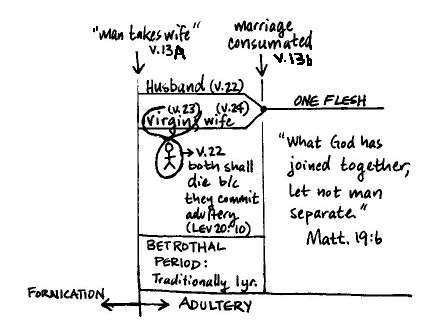
|
 Note, this article is part of a topical study series.
Note, this article is part of a topical study series.This page seeks to explain the "divorce exception clause", given in Matthew 5:32 and Matthew 19:9, which says:
"But I say unto you,
That whosoever shall put away his wife, saving for the cause of fornication, causeth her to commit adultery: and whosoever shall marry her that is divorced committeth adultery." Matthew 5:32
"And I say unto you,
Here, Jesus was talking to the Pharisees, who were living under the
Old Testament Law
(see
When did the New Testament begin?). This exception clause is
referring to the Mosaic permission of
divorce (because of the hardness of the men's hearts):
Whosoever shall put away his wife, except it be for fornication, and shall marry another, committeth adultery: and whoso marrieth her which is put away doth commit adultery." Matthew 19:9
"When a man hath taken a wife, and married her,
and it come to pass that he hath found some uncleanness in her:
then let him write her a bill of divorcement, and give it in her hand,
and send her out of his house. And when she is departed out of his house,
she may go and be another man's wife."
Deuteronomy 24:1-2 The first observation to make here is the Mosaic law of divorce is only for Jewish men under the law. The Matthew 19:9 exception is nowhere given for the case of women. In the Old Testament, we see examples of the usage of the Deuteronomy 24:1 law in Ezra 10:3, Jeremiah 3:8, and Isaiah 50:1. Whereas the majority of the present day church interprets this to be in any case where adultery has been committed, the innocent spouse is allowed to divorce the adulterer, and is allowed to remarry (see footnote 1), the early church differed from this view considerably (please see my quote from Myron Horst). Myron said: What is significant is that in all of the writings of the early Christians, I did not find any teaching that the early Church believed that Jesus' words in Matthew 19:9, "Whosoever shall put away his wife, except it be for fornication, and shall marry another, committeth adultery: and whoso marrieth her which is put away doth commit adultery," permitted remarriage. I was not able to find remarriage allowed in any of the writings of the early Christians They all speak the same thing that remarriage after divorce is sin. The Hebrew Tradition of MarriagesTo really understand the exception that Jesus was talking about, one really has to understand that the way marriages were done in the Hebrew tradition was very different from our current customs. Deuteronomy 22:13-30 and 24:1-5 gives some of the background for the Mosaic law, which Jesus was referring to in Matthew 19:9. The following sketch illustrates the Hebrew marriage with respect to Deuteronomy 22:
 Deuteronomy 22:23 says:
"If a damsel that is a virgin be betrothed
unto an husband,
This shows that in that day a man became a husband when he
"bethrothed" his wife. Some people might call this an
"engagement". Darrell G. Young (1) wrote:
and a man find her in the city, and lie with her;" The Betrothal, or "Kiddushin" was not like today's engagement period. It included a one year period in which Jewish men were excused from military service for the express purpose of preparing and building a bridal chamber facility, replete with every provision befitting a Queen.A "bethrothment" had legal ramifications; in other words, the only way out of a betrothment was by divorce. Verse 22 says:
"If a man be found lying with a woman married to an husband,
then they shall both of them die, both the man that lay with the woman, and the woman: so shalt thou put away evil from Israel." Deuteronomy 22:22 So we know that, once the marriage has been consummated, if the wife committed adultery with another, then they both should be put to death. This law was not always carried out because they were to be caught "in the very act" (John 8:4). Related Articles
Footnotes
References
|
